FAMOUS CRIME STORIES FROM THE PAST
When police arrested a Pakistan passport forger, little did they realize that the man and his team had links to the terrorist group in Spain responsible for the bombings of four trains in Madrid. Maxmilian Wechsler recalls the case that grabbed headline news around the world
| SIX years ago, officers from Thailand’s elite DSI (Department of Special Investigations) arrested a Pakistani national and charged him with operating a passport forgery ring with connections to international terrorist groups. The operation that took down Muhammad Ather Butt and associates in Thailand spanned two continents and is considered one of the DSI’s finest hours since its formation in 2002. The DSI officer in charge of the case – codenamed ‘Operation Alpha’ – agreed to provide details of the case on condition of anonymity, as department regulations prohibit self-promotion. Before joining the DSI in 2004, the officer was assigned to the Special Branch (SB) police and involved in the arrest of Riduan Isamuddin, also known as the Bali bomber, whose role in the terrorist attack on the famous Indonesian island was reported in the June issue of The BigChilli. |
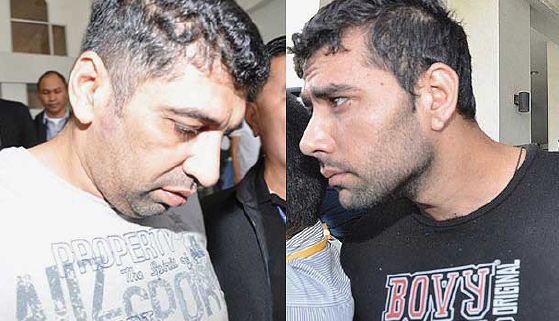 Left: Muhammad Ather Butt. Right: Zezan Azzan Butt
Left: Muhammad Ather Butt. Right: Zezan Azzan Butt The bust
Mr Butt, aged 39 at the time of his arrest, was also known as Tony. He and his 25-year-old Thai girlfriend, Sirikalya Kitbamrung, were detained by immigration officers and DSI officers as they were about to cross into Laos from Nong Khai on November 30, 2010.
“We found US$90,000 in cash under the seat of the car,” said the DSI man. “Tony’s nephew, Zezan Azzan Butt, then aged 27, was arrested later in the day in Bangkok’s Rat Burana district. The gang also had members operating in Europe, including Tony’s younger brother Naveed and a close friend from Pakistan.” The DSI officer and his team uncovered evidence that over the previous four years Tony had received large sums of money from outside of Thailand and also made large transfers out of the country.
Within days, the arrests suddenly took on much greater significance when it was discovered the gang had links to the terrorist group in Spain that was responsible for the coordinated bombings of four commuter trains in Madrid on March 11, 2004, and several other terrorist strikes. The Madrid train bombings killed 191 people and injured hundreds. They were the most deadly attacks in Europe since the 1988 bombing of Pan Am flight 103 over Lockerbie, Scotland, that killed 259 passengers and crew members and 11 town residents.
What’s more, Tony’s gang was also allegedly responsible for providing forged passports for the Pakistan-based Laskhar-e-Taiba group, which has been accused of plotting the November 2008 Mumbai attacks in which 10 militants killed at least 166 people. They also allegedly supplied passports to the defeated Liberation Tigers of Tamil Eelam separatist group in Sri Lanka.
Tony, a native of Gujranwala, near Pakistan’s capital city, Islamabad, actually started out as a small-time forger in Thailand a decade before his arrest. He would make alterations to stolen passports which he then sold locally or sent to customers in Pakistan, India or other countries in the region. The low-key operation became more sophisticated after he found a Thai girlfriend, learned how to speak Thai, and established good relations with certain Thai authorities to give him protection.
“He learned how to survive in Thailand,” said the DSI officer. “From my experience, criminals in this trade always follow the same pattern, whether they’re from Pakistan, Iran or wherever. It’s nearly impossible for someone to do this type of illegal business for long in Thailand without help from a Thai woman to support their criminal activities by opening bank accounts and renting post boxes, apartments, and so on, in her name. That’s what Ms Sirikalya did for Tony.
“Forgers also need help from officials to give them protection. They either pay bribes or become an informant, as was the case with Tony.” The DSI agent said that once he and his men learned what Tony was up to, they were fully determined to arrest and prosecute him no matter who he might know.
“Mr Butt’s business was going well and expanding year after year because they did good work. Orders were coming in and so was the money. After a few years he gained a reputation as the best passport forger in Thailand, and others in the business admired him. He was number one, which was quite an achievement because at the time there were a lot of active Thai and foreign forgery gangs.
“It’s not clear if Tony had any connections to terrorists other than just supplying them passports. Maybe that’s all he did. I don’t think he knew them personally or was in on their plans. But we do know Tony was a friend of Marc Ghulam Farid, also known as Atiq Ur Rehman, who Spanish police suspect was the man who actually sold passports to the terrorists who orchestrated the Madrid bombings,” said the DSI agent.
Mr Butt, aged 39 at the time of his arrest, was also known as Tony. He and his 25-year-old Thai girlfriend, Sirikalya Kitbamrung, were detained by immigration officers and DSI officers as they were about to cross into Laos from Nong Khai on November 30, 2010.
“We found US$90,000 in cash under the seat of the car,” said the DSI man. “Tony’s nephew, Zezan Azzan Butt, then aged 27, was arrested later in the day in Bangkok’s Rat Burana district. The gang also had members operating in Europe, including Tony’s younger brother Naveed and a close friend from Pakistan.” The DSI officer and his team uncovered evidence that over the previous four years Tony had received large sums of money from outside of Thailand and also made large transfers out of the country.
Within days, the arrests suddenly took on much greater significance when it was discovered the gang had links to the terrorist group in Spain that was responsible for the coordinated bombings of four commuter trains in Madrid on March 11, 2004, and several other terrorist strikes. The Madrid train bombings killed 191 people and injured hundreds. They were the most deadly attacks in Europe since the 1988 bombing of Pan Am flight 103 over Lockerbie, Scotland, that killed 259 passengers and crew members and 11 town residents.
What’s more, Tony’s gang was also allegedly responsible for providing forged passports for the Pakistan-based Laskhar-e-Taiba group, which has been accused of plotting the November 2008 Mumbai attacks in which 10 militants killed at least 166 people. They also allegedly supplied passports to the defeated Liberation Tigers of Tamil Eelam separatist group in Sri Lanka.
Tony, a native of Gujranwala, near Pakistan’s capital city, Islamabad, actually started out as a small-time forger in Thailand a decade before his arrest. He would make alterations to stolen passports which he then sold locally or sent to customers in Pakistan, India or other countries in the region. The low-key operation became more sophisticated after he found a Thai girlfriend, learned how to speak Thai, and established good relations with certain Thai authorities to give him protection.
“He learned how to survive in Thailand,” said the DSI officer. “From my experience, criminals in this trade always follow the same pattern, whether they’re from Pakistan, Iran or wherever. It’s nearly impossible for someone to do this type of illegal business for long in Thailand without help from a Thai woman to support their criminal activities by opening bank accounts and renting post boxes, apartments, and so on, in her name. That’s what Ms Sirikalya did for Tony.
“Forgers also need help from officials to give them protection. They either pay bribes or become an informant, as was the case with Tony.” The DSI agent said that once he and his men learned what Tony was up to, they were fully determined to arrest and prosecute him no matter who he might know.
“Mr Butt’s business was going well and expanding year after year because they did good work. Orders were coming in and so was the money. After a few years he gained a reputation as the best passport forger in Thailand, and others in the business admired him. He was number one, which was quite an achievement because at the time there were a lot of active Thai and foreign forgery gangs.
“It’s not clear if Tony had any connections to terrorists other than just supplying them passports. Maybe that’s all he did. I don’t think he knew them personally or was in on their plans. But we do know Tony was a friend of Marc Ghulam Farid, also known as Atiq Ur Rehman, who Spanish police suspect was the man who actually sold passports to the terrorists who orchestrated the Madrid bombings,” said the DSI agent.
Mr Butt and Farid are from the same town in Pakistan and went into partnership in Bangkok in 2008. They shared a home but were involved with different circles in running their passport forgery enterprise. Mr Farid eventually moved to Spain and was responsible for shipping stolen passports to Thailand for forgery and alteration.
A major breakthrough in the case came when Spanish police arrested a member of the terrorist group behind the Madrid bombings who was travelling on a forged passport. He provided information on Mr Farid, who was detained by Belgian police in April 2009. After his arrest, Mr Farid’s Thai wife, Orawan Limprasert, returned to Thailand, where she went into hiding and quickly became involved in the passport forgery business again.
Unbeknownst to her, the DSI team was on to her the moment she stepped foot back inside Thailand. She was placed under surveillance and her phone calls were monitored. The DSI team collected the telephone numbers of her overseas calls. They also kept in close contact with Spanish police, who, with the assistance of Belgian police, identified a man who was collecting lost and stolen passports in Belgium. The man, Ahboor Rambarak Fath, a British citizen of Iranian origin, was followed to a hotel in central Madrid where he met with Tony’s younger brother, Naveed. The DSI team already knew of him since he frequently communicated with Tony by phone or email.
Mr Fath was arrested in September 2009 at Suvarnabhumi Airport with 103 stolen passports in his checked bag. The passports were mainly from European Union countries, but included some from Canada and Israel. “During interrogation Mr Fath confessed that he was supposed to deliver the passports to Tony for alteration,” said the DSI officer. Ms Orawan was arrested three months later in Bangkok in possession of 40 sets of blank counterfeit pages used to forge British passports.
“From our interrogation of her and other investigations leading from the interrogation, we collected a lot of information that led us to Mr Butt,” said the DSI agent. “That’s when we started investigating the relationship between Tony in Thailand and the gang in Madrid.”
Investigators learned that Tony had become addicted to “ice” (crystal methamphetamine) after he began dealing the potent drug four or five years earlier. The DSI hatched a plan to arrest Mr Butt for drugs with the help of an undercover European agent in July 2010, but the plan was aborted. It was considered too dangerous because Tony insisted on meeting the agent at an unsecured location and on his terms.
From their surveillance operations the DSI team learned that Tony and his girlfriend drove to Nong Khai once a month and crossed into Laos to deliver forged passports to a customer. On November 10 the DSI team along with immigration officers pounced on their car as it was stopped at the border checkpoint.
fter the arrest Tony’s mobile phone service was immediately closed. “We were requested by the Spanish police to keep it off for at least six hours so that he couldn’t warn his people in Spain. They were waiting for us to arrest Tony before gang members were rounded up in Barcelona and Belgium. Seven men – six Pakistanis and one Nigerian – were arrested in Barcelona and accused of providing counterfeit identification documents to groups linked to al-Qaeda.”
The DSI team searched Mr Butt’s two-room apartment in Rat Burana. The officer said one room was like a small graphics factory, with several computers, a high-definition scanner and an expensive printer. The team found almost 10,000 pieces of evidence, including photos, passports, counterfeit data pages for EU, Canadian, Chinese and Israeli passports, and visa stickers and stamps for the US and Schengen countries.
“Among the confiscated materials were over 100 passport-size photos of people who mostly had Middle Eastern features,” said the DSI officer. “The photos were sent to him by post and other means to insert into stolen passports. He had been doing this business for 10 years, so you can imagine how big his network was and how many customers he had. I estimate that hundreds of people in the Middle East bought Tony’s products.”
The investigators also seized gold ornaments, 500,000 baht and about US$3,000 in cash at the apartment. Asked about the US$90,000 found hidden under the carpet on the driver’s side of his Honda Civic when he was arrested, Tony said he was hiding it from his girlfriend. According to press reports one of Ms Sirikalya’s relatives is or was a senior police officer based in Bangkok.
| The DSI officer said Tony’s name had been connected to forgery in Thailand for years, but it was very difficult to come up with evidence, and frankly there wasn’t that much interest. “But after Ms Orawan’s arrest and the information we gathered from her, we were able to exchange information with Spanish police and identify Tony as the leader of the gang. He became our main target.” The officer said he believed there were at least 10 gang members in Thailand, but there wasn’t time to gather evidence to arrest them all as they had to move quickly to get the leader. He believes there are three reasons Tony selected Thailand as his base: “For one thing, he knew that you can negotiate with some law enforcement people here; two, it is easy to enter and leave the country; and maybe most important, some Thai officials don’t regard passport forgery as a serious offence. Their attitude is that the counterfeiters only deal in foreign passports, so why should we worry? “Through interrogating the suspects we found some very interesting bits of information, one in particular: Tony flew to Pakistan to celebrate a Muslim festival in mid-November 2010, at a time when we were hot on his heels. After his return on November 23, someone apparently told him: ‘The DSI wants to arrest you with the passports. Be careful.’ |
“Mr Butt was a major player, at least in Thailand. People in his business both feared and respected him because he was well connected and he had a lot of money. His network reportedly stretched to Iran, India and other countries. It was dangerous to cross him and most people we talked to said they didn’t like his personality. He was unfriendly and rude to almost everyone because he thought that he was a big guy whose friends would protect him.
“Mr Butt would drive his car to meet his customers and often sit with people inside the car and talk. Sometimes he went to Sukhumvit Soi 3 and occasionally he met people in Pattaya, especially Iranians. He went to the post office himself to mail finished passports or pick up stolen passports for alterations,’’ said the DSI officer, adding that the most valued forgeries were of Canadian passports, followed by Israeli and then EU countries.
“Israeli passports cost US$1,500- US$ 2,000, while Canadian passports went for up to US$3,000. This price didn’t include alterations like changing a page with data.”
On June 13, 2012, Mr Butt was convicted and sentenced by the Criminal Court to 31 years in prison. Because he confessed to his crimes the sentence was reduced to 15 years and 6 months.
The DSI officer said he was very proud of the work done by his team, which consisted of five officers from DSI and five from the SB counter-terrorist division. He described the team as small but highly professional and technologically adept. The DSI officer also gave credit to the Spanish police intelligence unit he and his men exchanged information with on a daily basis. “They supported our team very well. We also communicated with police liaisons attached to several embassies in Bangkok at that time.”
The DSI was set up in October 2002 as a civilian law enforcement agency under the Ministry of Justice and modeled upon the US-based Federal Bureau of Investigation, with a mission to investigate complicated and sophisticated crimes.
“Mr Butt would drive his car to meet his customers and often sit with people inside the car and talk. Sometimes he went to Sukhumvit Soi 3 and occasionally he met people in Pattaya, especially Iranians. He went to the post office himself to mail finished passports or pick up stolen passports for alterations,’’ said the DSI officer, adding that the most valued forgeries were of Canadian passports, followed by Israeli and then EU countries.
“Israeli passports cost US$1,500- US$ 2,000, while Canadian passports went for up to US$3,000. This price didn’t include alterations like changing a page with data.”
On June 13, 2012, Mr Butt was convicted and sentenced by the Criminal Court to 31 years in prison. Because he confessed to his crimes the sentence was reduced to 15 years and 6 months.
The DSI officer said he was very proud of the work done by his team, which consisted of five officers from DSI and five from the SB counter-terrorist division. He described the team as small but highly professional and technologically adept. The DSI officer also gave credit to the Spanish police intelligence unit he and his men exchanged information with on a daily basis. “They supported our team very well. We also communicated with police liaisons attached to several embassies in Bangkok at that time.”
The DSI was set up in October 2002 as a civilian law enforcement agency under the Ministry of Justice and modeled upon the US-based Federal Bureau of Investigation, with a mission to investigate complicated and sophisticated crimes.

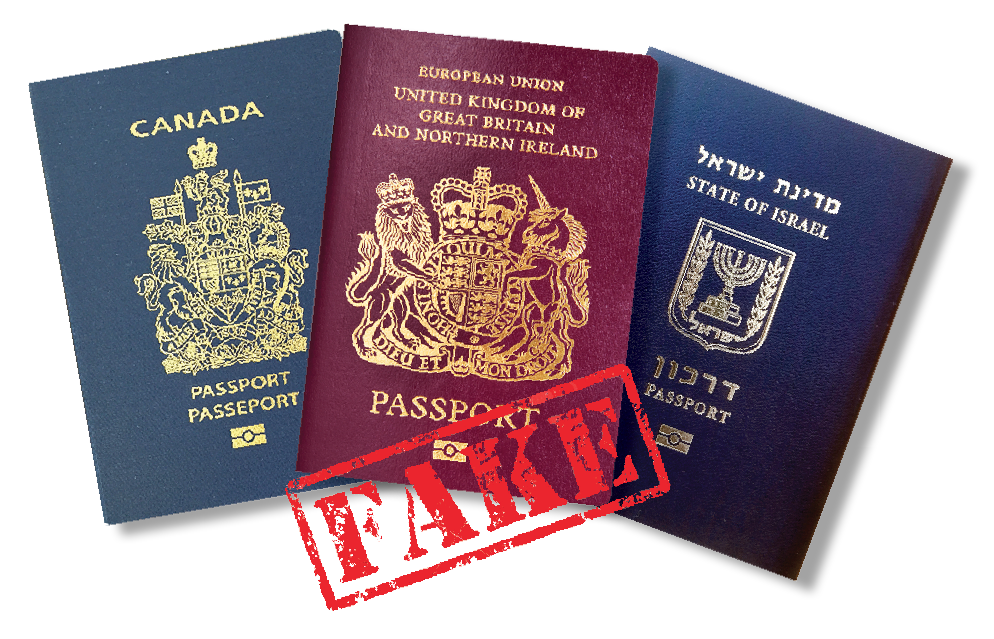
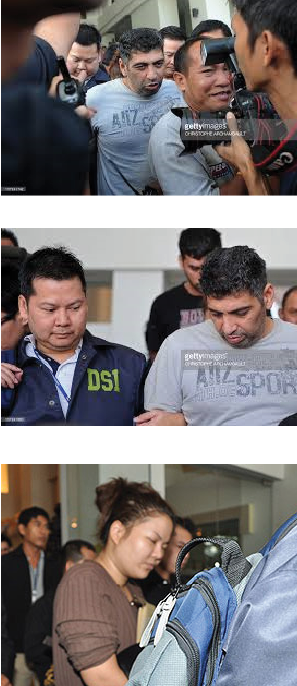
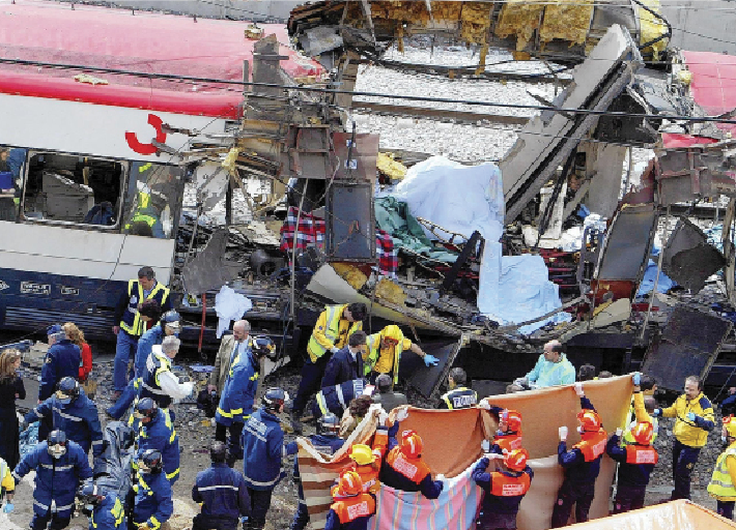
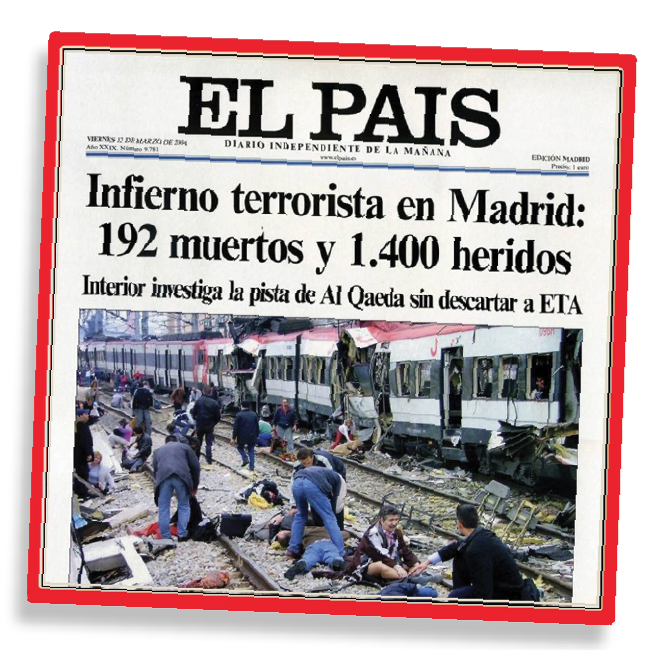
 RSS Feed
RSS Feed
















